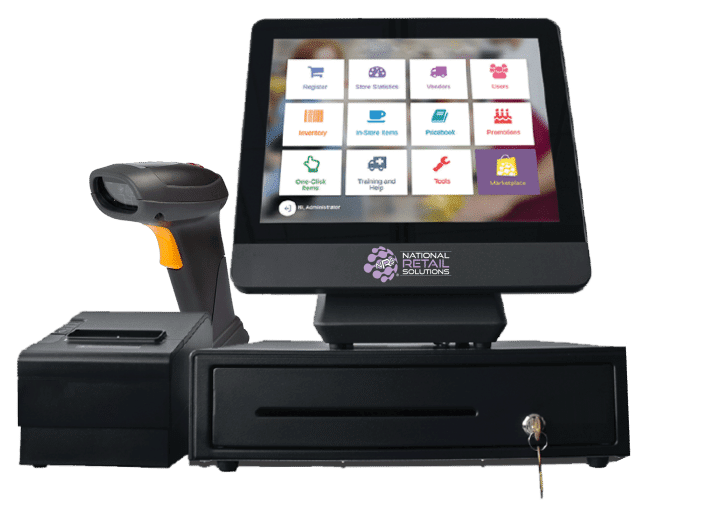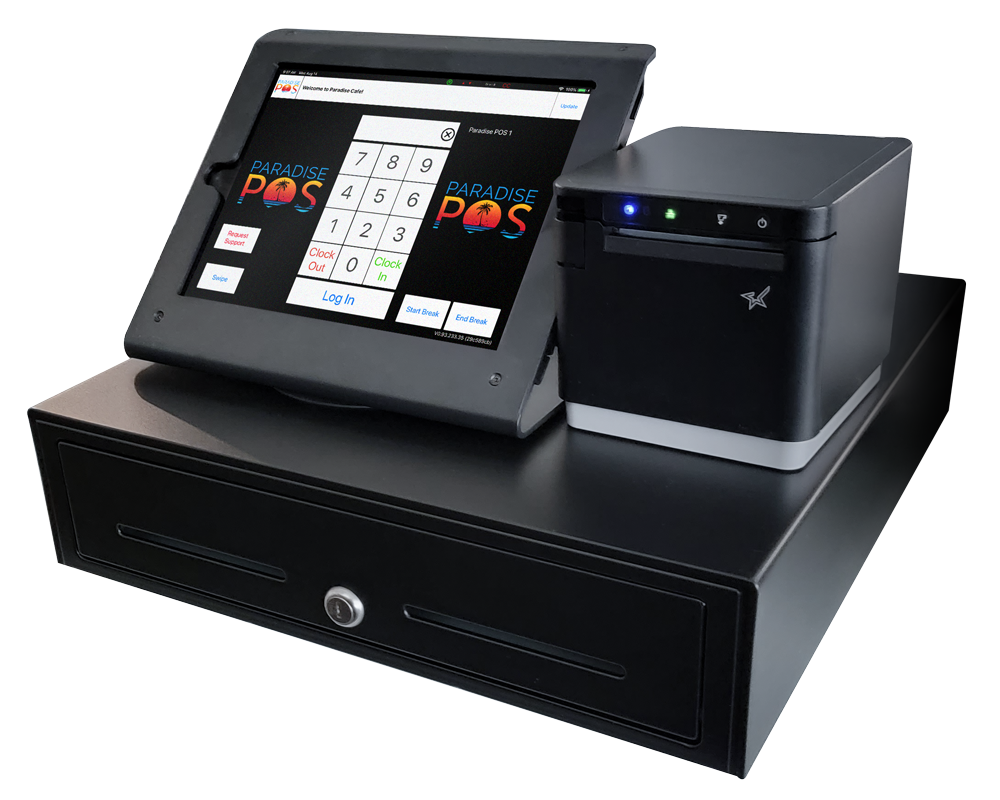The Definitive Guide for Restaurant Pos
The Definitive Guide for Restaurant Pos
Blog Article
How Pos Software can Save You Time, Stress, and Money.

POS Software: Retail Point-Of-Sale Solutions Streamline Deals
6 Simple Techniques For Pos Machine

Hardware Parts of a Point of Sale System What makes a POS system tick? It's not just software; the hardware plays a starring function. Consider it as the body to the software's brain. Without the right hardware, even the most sophisticated POS software is just a pretty face. Vital POS Hardware So, what are the must-haves? Let's simplify. The main processing unit, typically a computer system or tablet, is the heart of the operation. The monitor or touchscreen display permits personnel to engage with the system. A barcode scanner speeds up the checkout procedure. Keep in mind the days of manually getting in each code? The trusty invoice printer provides clients with a record of their purchase. A cash drawer keeps your money safe and organized. A card reader permits customers to pay with credit or debit cards. Diving Deeper: Beyond the Basics But wait, there's more! Depending on your service, you might need specific hardware. A dining establishment may incorporate kitchen area printers to relay orders, while a retail store may utilize label printers for product tagging. Ever wonder how your regional bakeshop immediately prints those delicious-looking labels? Picking the Right Hardware: A Balancing Act Choosing the right hardware isn't almost buying the most pricey devices. It's about discovering the sweet area between functionality, sturdiness, and spending plan. A small company just starting out might choose for a more fundamental setup, while a high-volume seller will require robust, high-performance machines. Is it better to purchase brand-new or used? Consider your alternatives carefully. A new system offers the latest technology and service warranty defense, but a refurbished system can save you cash. The Future of POS Hardware What does the future hold? Anticipate to see much more integration with mobile phones, biometric scanners for worker authentication, and advanced analytics dashboards showed on bigger, here clearer screens. Imagine a world where stock is instantly upgraded in real-time as items are scanned-- a world where you can track your best-selling product from anywhere in the world. The possibilities are unlimited, and the hardware is continually developing to meet the demands of today's services. Are you prepared to update your point of sale system?
Software Characteristics and Capabilities: The Heart of Your POS System
Ever watch a seasoned barista glide through a hectic early morning rush? Their secret isn't just caffeine; it's a smooth dance with their POS system. The software is the conductor of your business symphony, orchestrating whatever from sales to inventory. However what notes should you be listening for? What abilities really matter in today's market?
Inventory Management: Beyond Counting Beans
Forget spreadsheets that haunt your dreams. Modern POS systems provide real-time inventory tracking, alerting you when your stock of artisanal coffee beans dips precariously low. Think about it as a digital guardian angel, preventing those awkward "Sorry, we're out!" moments to customers. What if you could also predict demand based on historic data? Lots of systems now provide forecasting tools, a powerful weapon against overstocking and lost sales. This helps prevent the dilemma of running out of popular products or building up excess inventory of slow-moving items, both of which can constrain money flow and space.
Sales Reporting and Analytics: Translating the Data
Sales data is the brand-new gold, and your POS system is the miner. Forget simply knowing how much you offered today. Dive deep into the data to reveal trends, recognize your very popular products, and understand client habits. Which menu item sets perfectly with the everyday special? Which promo resonated most with your customers? These insights are not simply intriguing; they're actionable intelligence. Without reliable sales reporting, navigating the complexities of company decision-making becomes like sailing without a compass, increasing the possibility of missteps and missed opportunities.
Client Relationship Management (CRM): Structure Bridges, Not Walls
Remembering a regular customer's name and favorite order is charming, but scaling that personal touch is challenging. POS systems with CRM capabilities allow you to track consumer purchase history, choices, and even birthdays. Imagine automatically providing a discount on their birthday-- a little gesture that cultivates loyalty and encourages repeat organization. But there is the prospective snag of poor information quality, which can lead to unreliable consumer profiles and inefficient marketing efforts.
Payment Processing: Simplifying the Transaction
The checkout experience can make or break a sale. Smooth combination with various payment approaches-- charge card, mobile wallets, even copyright-- is non-negotiable. Can your system handle split payments? Does it use safe and secure tokenization to safeguard consumer data? A cumbersome payment process resembles hitting a sour note in your service symphony, possibly interrupting the whole efficiency. Ensuring compatibility with developing payment innovations and adherence to security standards are vital for maintaining client trust and functional effectiveness.
Employee Management: Keeping the Team in Sync
From clocking in and out to handling permissions and tracking efficiency, worker management features enhance operations and improve responsibility. Is scheduling a problem? Numerous POS systems offer integrated scheduling tools, enhancing staffing levels based upon anticipated need. A typical challenge that is often ignored is the difficulty of incorporating employee management functionalities with payroll systems, which can lead to mistakes and ineffectiveness in wage estimations.
Advanced Characteristics: Leveling Up Your Operations
- Table Management: Ideal for dining establishments, this function allows you to picture your dining-room, track table status, and handle bookings.
- Commitment Programs: Reward your finest clients and motivate repeat organization with incorporated commitment programs.
- Online Buying Integration: Seamlessly incorporate your POS system with online ordering platforms to expand your reach.
Choosing the best POS system is about more than simply functionality; it's about discovering a partner that can grow with your company. Consider your existing requirements, prepare for future growth, and do not be afraid to ask the tough concerns. The best software application can change your organization from a disorderly cacophony into an unified masterpiece.
Industry-Specific POS System Applications
Think about the local bakeshop, busy with morning clients yearning fresh croissants. A generic POS system might deal with transactions, however can it handle complicated dishes, track component stock, or immediately adjust production schedules based on sales information? Probably not. That is where the charm of industry-specific POS systems shines.
Restaurants and Hospitality
For bustling dining establishments, speed and accuracy are paramount. The number of times have you seen servers juggling orders, modifications, and splitting bills, all while trying to supply excellent service? A restaurant POS system enhances these processes, permitting table management, kitchen area order tickets, and even online purchasing integration. These systems typically consist of functions like ingredient-level inventory tracking, important for managing food costs and lessening waste. Ever wonder why your favorite meal is sometimes unavailable? It may originate from an absence of proper stock management.
- Table Management
- Kitchen Order Tickets
- Online Ordering Combination
- Ingredient-Level Stock Tracking
Retail Solutions
Retail, with its diverse stock and client interactions, requires a various set of tools. Imagine a store clothes store struggling to keep track of sizes, colors, and seasonal collections using a basic checkout system. An industry-specific retail POS system provides functions like barcode scanning, client commitment programs, and detailed sales reporting. These systems can even incorporate with e-commerce platforms, supplying a smooth omnichannel experience for consumers. Did you know some retail POS systems can forecast future sales trends based on historic information? Now that is effective!
The Perils of a Mismatch
Selecting the wrong POS system can produce substantial functional hurdles. A clothes store utilizing a dining establishment POS, for instance, would discover it unsuitable for managing stock with sizes and colors. The absence of proper reporting and analytics could cause mistaken purchasing choices and lost income. The outcome might be similar to trying to fit a square peg in a round hole.
Secret Factors to consider
Choosing an industry-specific POS system needs mindful examination. Think of your company's special requirements and operational workflows. Does the system incorporate with existing software? Does it offer the required reporting capabilities? Is it scalable to accommodate future growth? A well-chosen POS system is not just a deal tool; it's a tactical asset that can drive effectiveness, enhance client complete satisfaction, and ultimately, improve your bottom line. Remember, it is a financial investment in your business's future, not simply an expenditure.
Security Factors To Consider for Point of Sale Systems
Ever heard the tale of the mom-and-pop shop that lost everything due to the fact that of a single, overlooked security flaw in their POS system!.?. !? It's a cautionary tale, and it highlights a critical aspect frequently overshadowed by the allure of fancy functions and streamlined operations. The reality is, a POS system is just as good as its security. What excellent is a system that crunches numbers in a flash if it enables criminals to swipe client's information just as quickly?
The Vulnerability Minefield
The digital landscape is a battleground. Every POS system, despite size or sophistication, is a possible target. Are you truly prepared for the dangers lurking around the corner? The genuine pinch comes when you find that your out-of-date software has an open hole that hackers can exploit, turning your company into an unwitting accomplice in identity theft. The difficulty is that hackers are crafty and are always changing their strategies.
Common Security Spaces and Specialist Tips
- Weak Passwords: "Password123" isn't cutting it. Usage strong, special passwords for all POS system accounts and alter them routinely. Two-factor authentication is a must.
- Unsecured Networks: Your Wi-Fi resembles leaving the front door open. Protect your network with strong file encryption (WPA3 if possible) and consider a separate network for your POS system.
- Out-of-date Software Application: Software vendors patch security holes all the time. Stopping working to upgrade is like inviting problem. Set up automated updates or schedule routine upkeep.
- Worker Training: Your staff is your very first line of defense. Train them to acknowledge phishing attempts, safeguard passwords, and report suspicious activity.
Information Encryption: Your Guard Against the Dark Arts
Think about data file encryption as a secret code. It scrambles sensitive details, like credit card numbers, making it unreadable to unapproved users. Without file encryption, your clients' monetary details are like sitting ducks, ripe for the selecting by cybercriminals. It's not simply about securing your customers; it's about safeguarding your credibility and avoiding large fines.
PCI Compliance: The Rulebook You Can't Overlook
If you accept charge card, you're bound by the Payment Card Market Data Security Requirement (PCI DSS) It's a set of security standards designed to secure cardholder information. Failing to comply can lead to fines, penalties, and even the loss of your ability to process charge card payments. It's a headache, yes, however it's a required one. Think about PCI compliance as the expense of doing organization in the digital age.
Consider this: every deal processed through your point of sale is a prospective entry point for harmful stars. By executing robust security measures, you're not just securing your company; you're protecting your consumers' trust and making sure the long-lasting practicality of your operations. The security of your POS system isn't simply a technical concern; it's an organization necessary. It needs continuous caution, proactive measures, and a commitment to staying ahead of the curve.